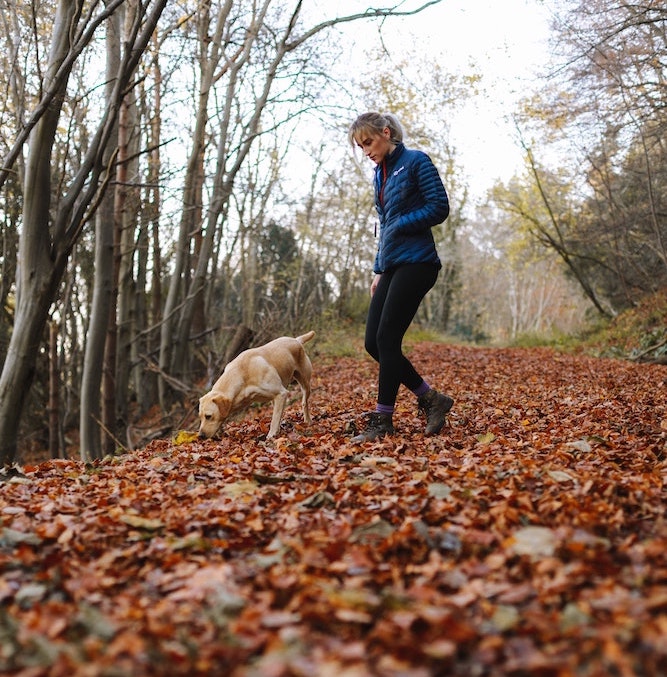
Dog Depression
In my line of work, I am called to see a lot of dogs who are showing signs of what can only be described as clinical dog depression. If you google dog depression you’ll find various articles written on the subject as well as studies on how dogs can help humans with their depression. These are great but there’s something that really bothers me in all of the ones I have read through…The dog’s emotional state is always portrayed as less important than a human’s, and in the case of some of the studies, it’s not taken into consideration at all.
Dogs are highly emotional animals and they feel all of the same things that we do, so it makes sense that they would suffer from depression as well. There are several reasons that your dog could become depressed.
1. Owner's emotional state
Dogs have the biggest heart per body mass of any living animal with it taking up 0.8% of their body rather than 0.6% like other animals. The heart sends out an electromagnetic field that contains certain information or coding which is affected by different emotions. When our dogs’ electromagnetic field mixes with ours, they can pick up on exactly how we feel at that moment in time and our emotional state will have a massive impact on them.
This is the reason that a dog seems guilty or ashamed when we get home and they have done something wrong in the house. It’s not because they know they’ve done wrong it’s because they can feel your anger, frustration or disappointment and they’re reacting to it. In the same way, if a dog is living in a home with one or more people with anxiety or depression then this can affect the dog’s emotional state and they tend to mirror their guardian’s condition.
2. Changes in routine
Dogs are very sensitive to changes in their daily routine. If you have ever had set walk or meal times and then tried to change them then you will understand. So when routine’s change and they are no longer able to do things that they would normally do it can cause them to become depressed. My partner is lucky enough to be able to take two of our dogs pretty much everywhere with him and has done for several years. It has now reached the point where if he is without one or both of them, people will actually ask him where they are. One of these dogs has recently been diagnosed with an aggressive form of cancer and we have had to make certain changes to her routine. The main change is that she has had to go from having her normal set meals to having food left down for her constantly so that she can eat little and often.
Due to having 18 other dogs at home, all of whom would try to eat the food if it was left, we decided that she should still go out with my partner and the other dog that normally goes should be left at home with me and the others so that she didn’t eat the food either.
Within a week of her being left at home, she started to show obvious signs of dog depression. She completely stopped eating, she stopped wanting to play and just lay staring out of the window all day. If I went near her and tried to do anything with her she would growl and she would snap at any of the other dogs if they even walked past her. Luckily I knew exactly what was happening and we sorted out other arrangements regarding the food so that she could start to go out again and almost instantly her mood and behaviour returned to normal.
3. Home or family changes
Moving home or welcoming a new baby or pet to the family can cause a whole myriad of emotions for everyone involved. As stated above dogs will pick up on the stress and anxiety within the family and will respond to it or mirror it back to us. These major life changes can also cause us to change our dogs’ routines and can again cause the issues above.
4. Grief
Dogs experience grief as well, it is well known that dogs can grieve for past guardians and also past canine companions and this grief can cause them to display signs of dog depression.
5. Being Rehomed
Dogs are renowned for showing signs of dog depression in rescue centres but they can also show signs of it when they get to a new home. This is due to one or more of the above reasons.
“Dogs are highly emotional animals and they feel all of the same things that we do, so it makes sense that they would suffer from depression as well.”
Seasonal Affective Disorder
Dogs also suffer from seasonal depression, also known as Seasonal Affective Disorder. This can occur based on the actual seasons but also on different stressful events that happen in the year, such as firework season or Christmas.
Just as with humans, dogs can become more depressed in the winter months when the days are shorter and the weather is worse. This is because we tend to walk them less or for shorter periods of time and spending time outside in a natural environment is crucial to our dogs’ mental, emotional, physical and spiritual wellbeing.
We live in a world where everything is either concrete or artificial in order to make our lives easier and more comfortable but this isn’t beneficial to our dogs’ or our own health.
Studies show that spending time in nature is an antidote for stress. It can lower our blood pressure and stress hormone levels, reduce nervous system arousal, reduce anxiety and improve mood, increase self-esteem and enhance the function of our immune system.

There is also scientific evidence that proves that reconnecting our bodies to the earth via a therapeutic technique known as grounding can realign our electrical energy and help with a variety of health conditions including depression.

Dogs need this connection with the earth, allowing their paws to touch natural ground, rather than the tarmac or concrete paths or the artificial grass that we cover our gardens with nowadays, allows free electrons from the earth to spread over and into the body which in turn has an antioxidant effect.
In the winter we tend to give our dogs shorter walks or don’t take them to the open spaces as often because of the dark evenings. The longer walks in the woods or the fields are usually restricted to the weekends when they can be carried out in daylight hours, and we give them more road walks during the week, effectively reducing their connection to the earth and restricting their ability to ground and rebalance their bodies. This along with the change in routine and the lack of daylight is a contributing factor in our dogs becoming depressed.
The symptoms of canine depression are similar to the symptoms of human depression
They can become withdrawn, they can go off their food, they become inactive and tend to sleep more, they can become moody and just want to be left alone and very rarely participate in activities that they usually enjoy, regardless of how much you try to entice them. Obviously all of these symptoms could be signs of other medical conditions so it is always best to seek veterinary advice if your dogs’ behaviour suddenly changes.
Most dogs bounce back from their bouts of depression with a bit of time and some extra TLC. You can help them recover quicker by exercising them more, engaging with them and
taking the time to do more of the things that they like. Just be careful not to encourage depressed behaviour by rewarding it. Reward the small amounts of happy behaviour like the slight wags of their tail, or the happy moments on the walks so that you are encouraging this instead. If these things don’t help your dog then there is medication that can be described by your vet if they feel that there is a need for it.
I personally use my canine therapy techniques to help a dog who has depression. I pinpoint the trigger or trauma that is causing it using animal communication and kinesiology. I then help the dog to release this trigger or trauma using a variety of my other therapy techniques which include hypnotherapy, reiki and other energy techniques, essential oils, flower essences, relaxation and grounding techniques and canine sensory exercises. I use the information I receive from the communication and the kinesiology to put together an individual plan for each dog because I strongly believe that one size never fits all when it comes to dog behaviour and each dog is unique.
Our Expert
My name is Becky and I am the founder of Therapy 4 Dogs.
Alongside being a canine therapist I am also a fully qualified dog groomer, dog walker and Reiki Master. I also have years of experience in RAW feeding and am a supplier of DAF raw food as well as a supplier of a CBD oil brand that can be used for dogs under your vet’s advice.
For more information: www.therapy-4-dogs.com
